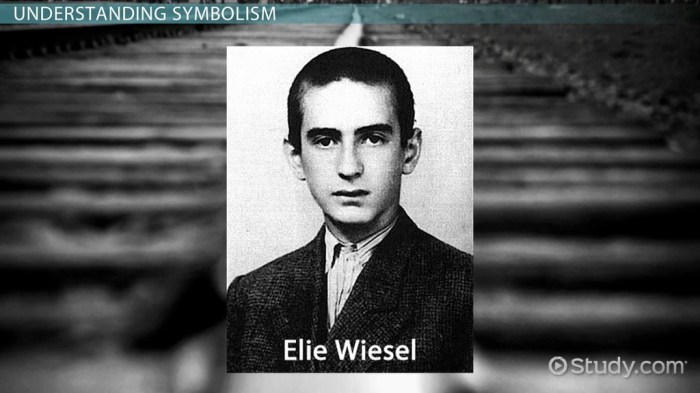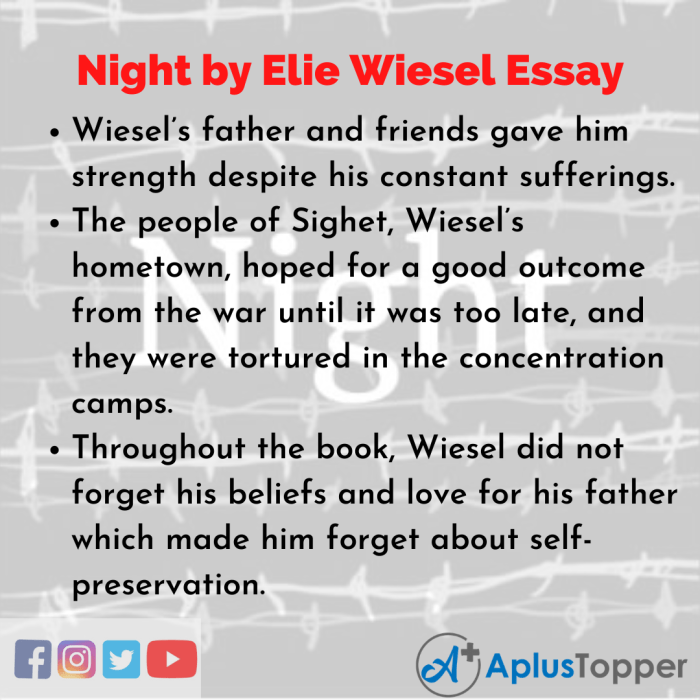Night test by elie wiesel – In Elie Wiesel’s haunting and evocative novel, Night Test, we embark on a harrowing journey through the darkest chapters of human history. Wiesel’s deeply personal account of his experiences during the Holocaust is a testament to the resilience of the human spirit and a stark reminder of the horrors that humanity is capable of.
Night Test is not merely a historical document; it is a profound meditation on faith, hope, and the nature of evil. Through the eyes of young Eliezer, we witness the unimaginable horrors of the concentration camps, the loss of innocence, and the struggle to maintain one’s humanity in the face of unspeakable cruelty.
Summary of Night by Elie Wiesel
Nightis a memoir by Elie Wiesel that recounts his experiences as a Jewish teenager during the Holocaust. The novel is set in Nazi-occupied Europe during World War II and follows Wiesel’s journey from his home in Sighet, Transylvania, to the Auschwitz and Buchenwald concentration camps.
The title “Night” is symbolic of the darkness and despair that Wiesel and other victims of the Holocaust endured. The novel explores themes of faith, suffering, and the resilience of the human spirit in the face of unimaginable evil.
Main Characters
- Elie Wiesel: The protagonist and narrator of the novel, a young Jewish boy who is sent to Auschwitz with his family.
- Shlomo Wiesel: Elie’s father, a devout Jew who struggles to maintain his faith in the face of the horrors of the Holocaust.
- Moishe the Beadle: A Jewish man who is the first to warn the Jews of Sighet about the Nazi threat.
- Rabbi Eliahu: A Jewish spiritual leader who is killed in the gas chambers at Auschwitz.
- Dr. Mengele: A Nazi doctor who performs cruel and inhumane experiments on the prisoners at Auschwitz.
Historical Context of Night
Nightby Elie Wiesel is a harrowing memoir that recounts the author’s experiences as a Jewish teenager during the Holocaust. The novel’s historical context is crucial for understanding the characters’ experiences and the themes of the work.
The Holocaust
The Holocaust was a genocide perpetrated by Nazi Germany against the Jewish people. During World War II, the Nazis systematically murdered six million Jews in concentration and extermination camps. Wiesel’s novel focuses on the experiences of Jewish prisoners in the Auschwitz-Birkenau concentration camp.
The Holocaust had a profound impact on the characters in Night. The prisoners were subjected to unimaginable horrors, including starvation, torture, and the constant threat of death. These experiences shattered their faith in humanity and left them deeply traumatized.
World War II
World War II was a global conflict that lasted from 1939 to 1945. The war was fought between the Axis powers (Germany, Japan, and Italy) and the Allies (Great Britain, the United States, and the Soviet Union). The Holocaust was a major part of the war, as the Nazis used their control of Europe to carry out their genocidal plans.
World War II had a significant impact on the characters in Night. The war created the conditions that allowed the Holocaust to happen. It also forced the characters to confront the horrors of war and the fragility of human life.
Themes in Night

The novel “Night” by Elie Wiesel explores profound themes that resonate with the human experience. These themes delve into the depths of faith, hope, and the nature of evil, revealing their complexities and their impact on individuals in the face of adversity.
Faith
In the midst of unimaginable horrors, Wiesel examines the struggle to maintain faith. Eliezer, the protagonist, grapples with his belief in God as he witnesses the atrocities committed against his people. The novel questions the existence of a benevolent God in the face of such suffering, while also exploring the ways in which faith can provide solace and strength.
The night test by Elie Wiesel, a poignant exploration of the horrors of the Holocaust, prompts us to reflect on the enduring legacy of intolerance and discrimination. Similar to the fraternity brothers of NC State Lambda Chi Alpha , who faced allegations of discriminatory behavior, we must confront and challenge the prejudices that divide us.
Wiesel’s powerful narrative reminds us that the fight against injustice and hatred remains an ongoing battle.
Hope, Night test by elie wiesel
Throughout the novel, hope emerges as a flicker of light in the darkness. Despite the horrors they endure, the prisoners cling to the hope of liberation and a better future. Wiesel explores the transformative power of hope, showing how it can sustain individuals even in the most desperate circumstances.
Nature of Evil
Wiesel confronts the profound question of the nature of evil in “Night.” The novel depicts the depths of human depravity and the capacity for cruelty. Wiesel examines the psychological and social factors that contribute to the rise of evil, while also exploring the responsibility of individuals to resist it.
Characters in Night: Night Test By Elie Wiesel

The characters in Elie Wiesel’s Night undergo profound transformations as they confront the horrors of the Holocaust. Eliezer, his father, and Moishe the Beadle each face their own unique struggles and exhibit remarkable resilience and determination in the face of adversity.
Eliezer
Eliezer, the novel’s protagonist, is a young Jewish boy who witnesses the horrors of the Holocaust firsthand. He is a devout believer in God, but his faith is shaken by the atrocities he witnesses. Eliezer’s journey is one of survival, as he struggles to maintain his humanity and his connection to his God in the face of unimaginable suffering.
Eliezer’s Father
Eliezer’s father is a respected elder who embodies the wisdom and strength of the Jewish community. He is a devout believer in God and provides Eliezer with guidance and support throughout their ordeal. Eliezer’s father’s unwavering faith and resilience serve as a source of strength for Eliezer.
Moishe the Beadle
Moishe the Beadle is a Holocaust survivor who returns to Eliezer’s village to warn the community of the Nazi’s plans. He is a witness to the horrors of the concentration camps and his testimony serves as a foreshadowing of the events to come.
Moishe’s experiences serve as a reminder of the horrors that await Eliezer and his family.
Symbolism in Night
Elie Wiesel’s Night is a powerful novel that uses symbolism to convey its themes and ideas. The novel is filled with symbols, both large and small, that help to create a vivid and haunting picture of the Holocaust.
One of the most important symbols in the novel is the use of light and darkness. Light is often associated with hope and salvation, while darkness is associated with despair and death. Throughout the novel, Wiesel uses these two symbols to contrast the horrors of the Holocaust with the hope that still exists in the human heart.
Fire
Another important symbol in the novel is fire. Fire can be both destructive and life-giving. In the Holocaust, fire was used to destroy lives and homes. However, it was also used to provide warmth and comfort to the prisoners.
The Number Three
The number three is also a significant symbol in the novel. It appears in many different contexts throughout the book, often in relation to death and suffering. For example, there are three main characters in the novel: Eliezer, his father, and Moishe the Beadle.
There are also three main sections of the novel: the arrival at Auschwitz, the selection process, and the liberation.
These symbols contribute to the novel’s meaning by helping to create a sense of atmosphere and mood. They also help to convey the novel’s themes of hope, despair, and the struggle for survival.
Literary Techniques in Night
Elie Wiesel employs a range of literary techniques in Nightto convey the horrors of the Holocaust and explore its profound impact on the human experience. These techniques include allegory, irony, and foreshadowing, which enhance the novel’s impact and deepen its meaning.
Allegory
Nightis an allegory, a story that has a literal meaning but also a deeper, symbolic meaning. On a literal level, the novel recounts Elie Wiesel’s experiences in Nazi concentration camps during the Holocaust. On a deeper level, it explores the universal themes of good and evil, suffering and redemption, and the loss of faith.
- The concentration camps represent the depths of human evil and the horrors of totalitarianism.
- Elie’s journey through the camps represents the journey of humanity through darkness and despair.
- Elie’s loss of faith in God represents the loss of hope and meaning in a world shattered by violence and cruelty.
Irony
Wiesel uses irony to highlight the absurdity and horror of the Holocaust. For example, the prisoners in the camps are forced to wear striped uniforms that resemble pajamas, a cruel reminder of their loss of individuality and dignity.
Foreshadowing
Wiesel uses foreshadowing to create a sense of dread and inevitability. For example, Elie’s dream of a fire at the beginning of the novel foreshadows the burning of the crematoria at the end.
Critical Reception of Night

Upon its publication, Night was met with widespread critical acclaim, establishing Elie Wiesel as a leading voice in Holocaust literature. The novel’s raw and unflinching account of the horrors of Auschwitz and Buchenwald resonated deeply with readers, both survivors and non-survivors alike.
Night has been praised for its literary merit, its powerful imagery, and its ability to convey the unspeakable. Critics have hailed Wiesel’s ability to capture the complexities of the Holocaust experience, from the depths of despair to moments of hope and resilience.
Impact on Holocaust Literature
Night has had a profound impact on Holocaust literature. It is widely considered one of the most important works on the subject, and its influence can be seen in countless other works of fiction, non-fiction, and poetry. Night has helped to shape our understanding of the Holocaust and has played a crucial role in keeping the memory of the victims alive.
Enduring Relevance
Night continues to be read and studied by millions of people around the world. It is taught in schools, universities, and community centers, and it has been translated into more than 30 languages. Night’s message of hope and resilience is as relevant today as it was when it was first published.
Popular Questions
What is the significance of the title “Night”?
The title “Night” refers to the darkness and despair that enveloped the world during the Holocaust. It is a symbol of the horrors that Eliezer and countless others endured during that time.
How does Wiesel use symbolism in Night?
Wiesel uses symbolism throughout Night to convey the horrors of the Holocaust and the struggle to maintain hope in the face of despair. For example, the use of light and darkness represents the contrast between hope and despair, while the number three symbolizes the Trinity and the idea of hope amidst suffering.
What are the major themes explored in Night?
Night explores a range of complex themes, including faith, hope, and the nature of evil. Wiesel challenges the reader to question their own beliefs and to confront the darkness that can exist within humanity.